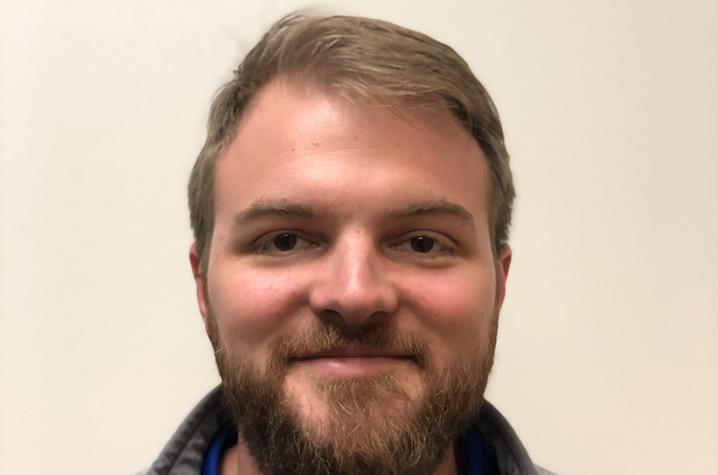UK Ag Grad Student Earns Research Award From U.S. Energy Department

LEXINGTON, Ky. (April 17, 2019) — B. Kirtley Amos, a University of Kentucky graduate student in the Integrated Plant and Soil Sciences Program within the College of Agriculture, Food and Environment, is the winner of a 2019 research award from the U.S. Department of Energy (DOE).
The Science Graduate Student Research (SCGSR) program is aimed at preparing talented graduate students for science, technology, engineering or mathematics (STEM) careers critically important to the DOE’s Office of Science mission, by providing graduate thesis research opportunities at DOE laboratories across the country.
Amos, from Lexington and a graduate of Lexington Catholic High School, is one of only 70 students from 52 research universities across the nation to receive the award. He will head to Oak Ridge National Laboratory in Tennessee later this year to work on research related to his graduate thesis. Amos’ area of specialization is biological and environmental research — computational biology and bioinformatics.
The research projects proposed by the new awardees demonstrate strong alignment with the mission areas of the Department of Energy that have a high priority. The SCGSR program plays an important role in sustaining a pipeline for highly skilled scientific and technological workforce development through providing new graduate research opportunities at national labs.
Through this program, students conduct part of their graduate thesis research at a DOE laboratory/facility, in collaboration with a department scientist. The research projects are expected to advance the graduate awardee’s overall doctoral thesis while providing access to the expertise, resources and capabilities available at leading laboratories such as Oak Ridge.
“These graduate student awards prepare young scientists for STEM careers critically important to the Department of Energy mission,” said U.S. Secretary of Energy Rick Perry. “We are proud of the accomplishments these outstanding awardees have already made, and look forward to following their achievements in years to come. They represent the future leadership and innovation that will allow American science and engineering to excel in the 21st century.”
This graduate research award provides supplemental funding for graduate students to spend three to 12 consecutive months at a DOE national laboratory facility. It also pays for travel to and from the laboratory, and a monthly stipend of up to $3,000 for general living expenses while at the host DOE laboratory during the award period.
“In receiving this award I have a great opportunity to collaborate with Dr. Dan Jacobson's lab and other scientists at Oak Ridge National Laboratory,” Amos said. “My dissertation work started with the screen of 50,000 small molecules on Arabidopsis, the model plant for plant genetics, using a liquid handling robot. Originally, once the screen had been completed, we, as a lab, wanted to use computational biology approaches to pick the compounds we wanted to pursue, but we lacked the experience to do so.”
In his work at Oak Ridge, Amos intends to use computational methods to determine how the compounds that his lab at UK found compare to known compounds that affect plants, and then cluster them by structural similarity. Then he plans to utilize these clusters to probe all of chemical space to add compounds that weren't screened to the list.
“Following that, we hope to determine how these small molecules interact with the protein targets that are common within the small molecule cluster, potentially predicting a novel mechanism of action,” added Amos. “This approach to small molecule screens allows plant scientists to pick exciting molecules via computer simulation then quickly check the choice with bench biology, expediting the process of novel small molecule discovery within plant biology.”
UK Horticulture Professor Seth DeBolt serves as Amos’ advisor.
“This prestigious award and the chance to work with Dr. Jacobson at Oak Ridge National Laboratory reflects the hard work and creativity that Kirtley puts into his research,” DeBolt said. “The project is completely transformational for food and bioenergy security. Just a great example of how the University of Kentucky gives brilliant young Kentucky students like Kirtley a canvas to be game changers.”




